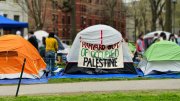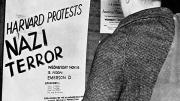UPDATE: May 10, 12:15 P.M.
This morning, Harvard Out of Occupied Palestine (HOOP) announced on Instagram that “Harvard has started sending out suspension notices” to students in the pro-Palestine encampment in Harvard Yard. Involuntary leave prevents students from taking exams (which end tomorrow), removes students from Harvard housing, and bars students from campus until reinstated. In a Monday email, Interim President Alan Garber threatened to place students in the “disruptive” encampment on involuntary leave (see below).
In another Instagram post early Friday morning, HOOP said that Garber met informally with student protest liaisons. According to HOOP, Garber offered not to suspend students if they ended the encampment. HOOP says they declined the request and counter-offered with “four tangible asks that would move Harvard forward on transparency and ethical investment.” When Garber rejected that offer, HOOP organizers decided to maintain the encampment despite the consequences. “We choose to stay in our tents,” HOOP wrote, “because we know there is no sacrifice too large to protest Harvard’s complicity in genocide."
HOOP and Harvard spokespeople did not immediately respond to requests for comment. Check back for updates.
UPDATE: May 6, 12:45 P.M.
Monday morning, interim president Alan M. Garber sent a message to Harvard students and alumni regarding the pro-Palestine encampment on Harvard Yard. He called the encampment “disruptive” and threatened to place participating students on “involuntary leave,” which would bar them from campus until reinstated. The email comes hours before the 5:00 P.M. deadline that Harvard Out of Occupied Palestine, the group leading the encampment, set for the University to “commence negotiations.”
Garber acknowledged that “the right to free speech, including protest and dissent, is vital to the work of the research university,” but noted “it is not unlimited,” citing Harvard’s recently revamped protest guidelines. He wrote that the encampment “favors the voices of a few over the rights of many who have experienced disruption in how they learn and work at a critical time of the semester” and urged protesters to end their “occupation of Harvard Yard.” He criticized protesters’ behavior, including yelling at Harvard staff who were collecting protesters’ Harvard ID information. He also cited reports that “passers-by have been confronted, surveilled, and followed,” actions he termed “indefensible and unacceptable.”
Garber turned his attention toward Commencement, noting that the “ongoing violation” of Harvard’s policies “becomes more consequential” as Commencement nears. Many members of the class of 2024 lost their high school graduations due to COVID, and he emphasized that it would be “especially painful” for the students to be “denied a full graduation ceremony for a second time.” (Columbia University announced this morning that it canceled its main commencement ceremony.)
In closing, Garber highlighted the University’s recent focus on civil discourse. “There are many ways for our community to engage constructively in reasoned discussion of complex issues, but initiating these difficult and crucial conversations does not require, or justify, interfering with the educational environment and Harvard’s academic mission,” he wrote. “Our disagreements are most effectively addressed through candid, constructive dialogue, building not on disruption, but on facts and reason.”
Read the full statement here.
UPDATE: May 3, 5 P.M.
Friday morning, Harvard Out of Occupied Palestine (HOOP), the group leading the pro-Palestine encampment in Harvard Yard, announced that it added tents on the east side of University Hall—in Tercentenary Theatre—and set a deadline of Monday, May 7, at 5:00 P.M. for “the University to commence negotiations with HOOP on the implementation of its demands.”
Since the encampment began on April 24, protesters have steadily added tents, increasing the camp’s footprint on the western side of Harvard Yard (the Old Yard). Friday morning’s expansion into Tercentenary Theatre comes as the University begins its Commencement preparations. Though the encampment itself has physically expanded during the past 10 days, the number of protesters has not noticeably increased.
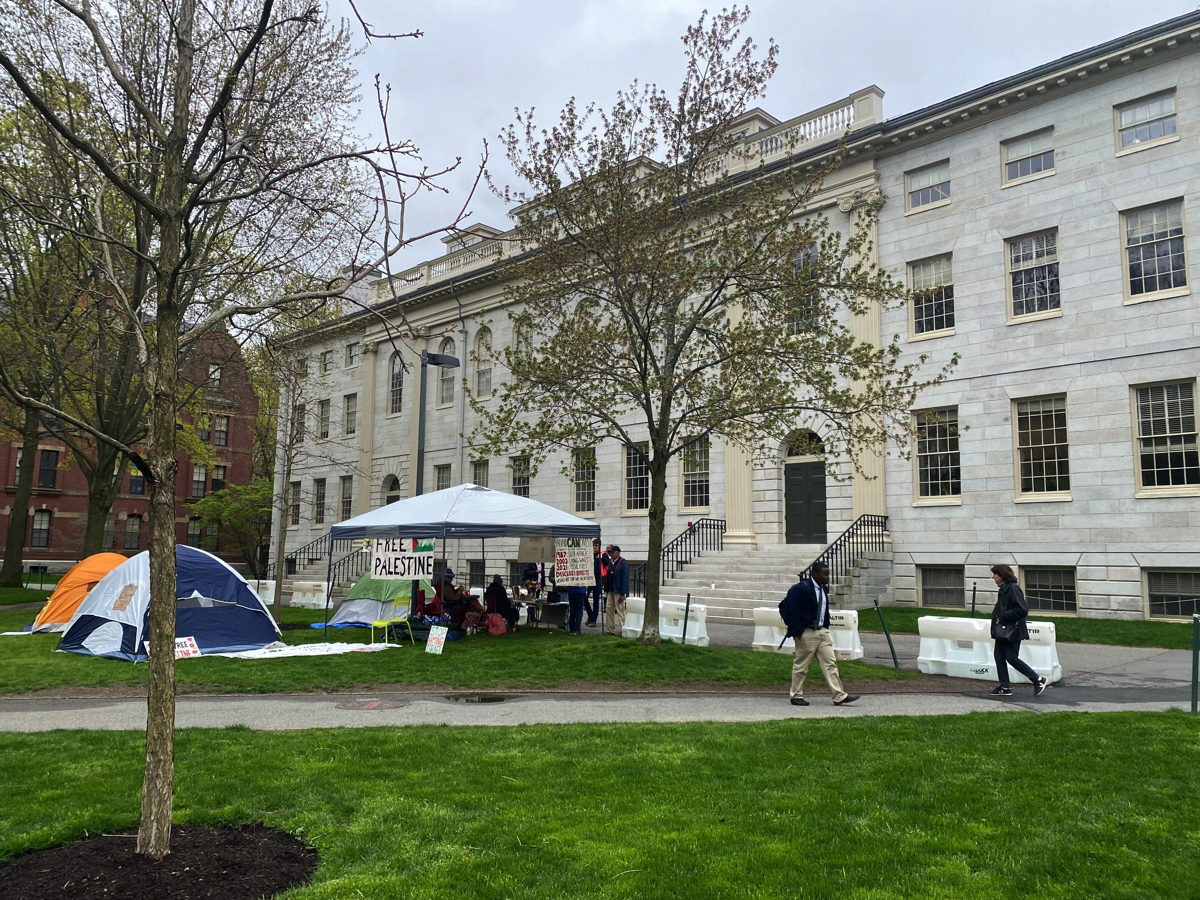
Harvard administrators have been collecting protesters’ ID information and have called students in front of the disciplinary Administrative Board. (The Crimson reported Monday that administrators summoned over more students to Ad Board, and HOOP today said the University gave “59 students and student workers disciplinary charges.”) In a news release, HOOP said that “the University has refused to meet with students and engage in good-faith negotiation.” College Dean Rakesh Khurana has been seen speaking with Harvard affiliates around the encampment and speaking with protesters on the west side of Massachusetts Hall.
In preparation for freshman move-out, which ends on May 12, Harvard is currently installing three-foot plastic water-filled barriers along the vehicle paths near the encampment. University spokesperson Jason Newton told The Crimson that the barricades will be placed in “positions of heavy traffic” in the Old Yard, but “will not encircle the entire Yard.” Access to the Yard remains limited to Harvard ID holders.
Read an in-depth account of the start of the encampment (posted on 4/24/24) below:
During the last week, pro-Palestine protesters at dozens of American universities have established encampments on school grounds. On Sunday, Harvard restricted access to the Yard, checking Harvard IDs at the gate and specifically noting that “structures, including tents and tables, are not permitted in the Yard without prior permission.”
Nonetheless, during a Wednesday afternoon rally against the administration’s Monday decision to suspend the Harvard Undergraduate Palestine Solidarity Committee, protesters rushed into a patch of grass and rapidly set up tents. Now, students seem primed to camp out in Harvard Yard.
A newly formed group, Harvard Out of Occupied Palestine, took responsibility for establishing the “liberated zone.” In an Instagram post, the group laid out three demands:
- “Disclose any and all investments—both institutional and financial—in Israel, the ongoing genocide in Gaza, and the occupation of Palestine.”
- “Divest from all such investments, and reinvest resources in Palestinian academic initiatives, communities, and culture.”
- “Drop all charges against students for their organizing and activism, and commit to ending the weaponization of the disciplinary policy.”
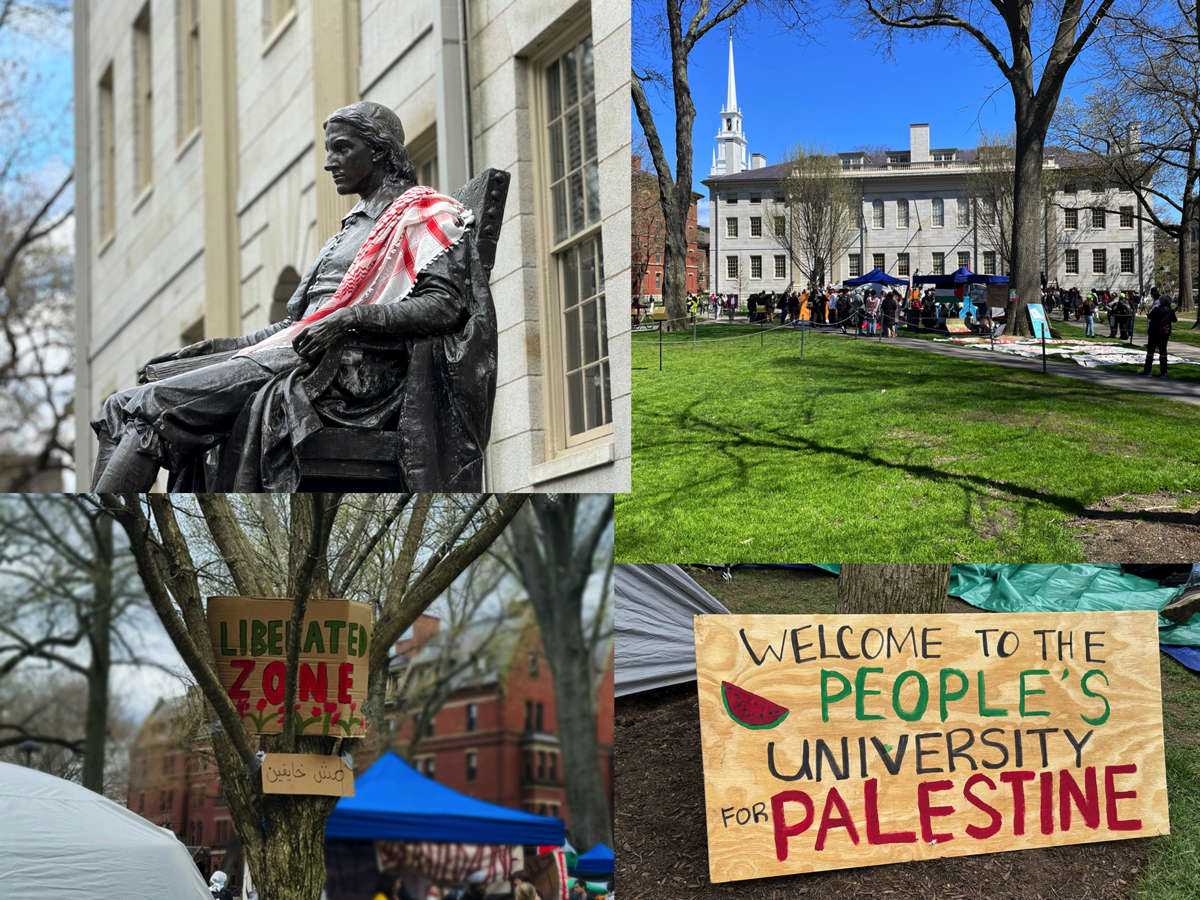
The Crimson reported that more than 500 people attended the initial protest, which began around noon. By 3 PM, the Yard had calmed. Around 70 students were sitting inside the encampment, whose borders are marked by a thin preexisting rope that Harvard Facilities uses to keep traffic off the spring grass. Protesters in reflective vests policed the edges, prepared to remove anyone whom the group deems not welcome in the encampment. (In November, Harvard investigated a physical confrontation between similar protest marshals and a counter-protester at Harvard Business School and indefinitely relieved a proctor of his duties for his involvement in the scuffle.)
In the encampment, protesters chatted among themselves, worked on their laptops, and ate snacks from three large tubs. During an organizational meeting of students in the encampment, conducted in hushed tones to avoid publication of details, leaders instructed students not to speak to administrators or press, but to show their Harvard ID if asked by an authority figure. (The group’s media liaison declined to speak with Harvard Magazine.) The protesters have divided themselves into groups based on their level of risk tolerance. Signs ring the encampment, including a map of Israel/Palestine with the words “from the river to the sea,” a phrase condemned by former president Claudine Gay in November.
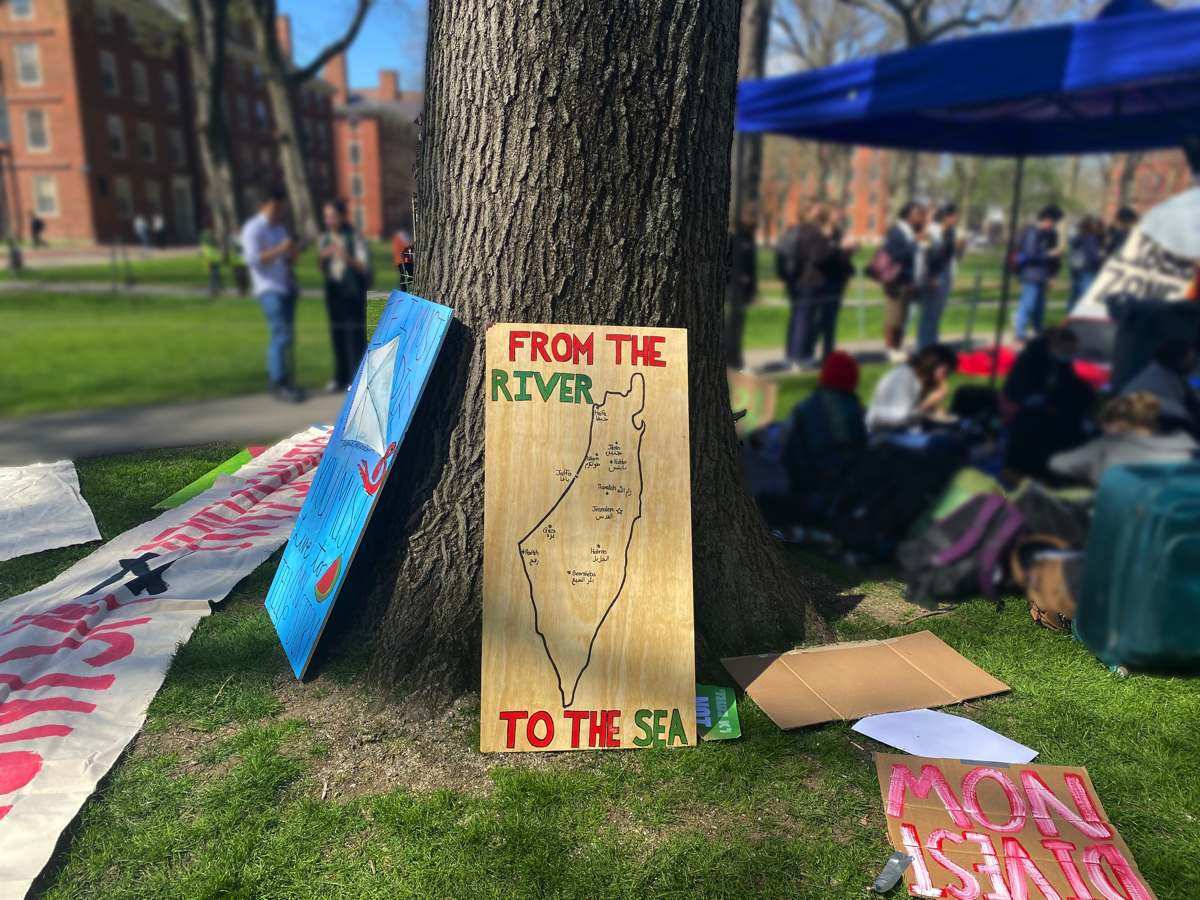
It is not yet clear how the Harvard administration will respond. Monday morning, Yale administrators ordered a large encampment outside Beinecke Library to be cleared, and police arrested about 47 students. At Columbia, administrators threatened to remove an encampment outside Low Library, but have not yet done so.
Following Harvard’s tumultuous fall semester, administrators have been thinking and talking about free expression. In January, President Alan Garber and Harvard’s deans clarified University policies surrounding campus protest. After a tumultuous fall, this spring the University has sponsored events about civil discourse and is trying to foster respectful disagreement.
For now, the student protesters remain in Harvard Yard, tents damp from an afternoon shower.
